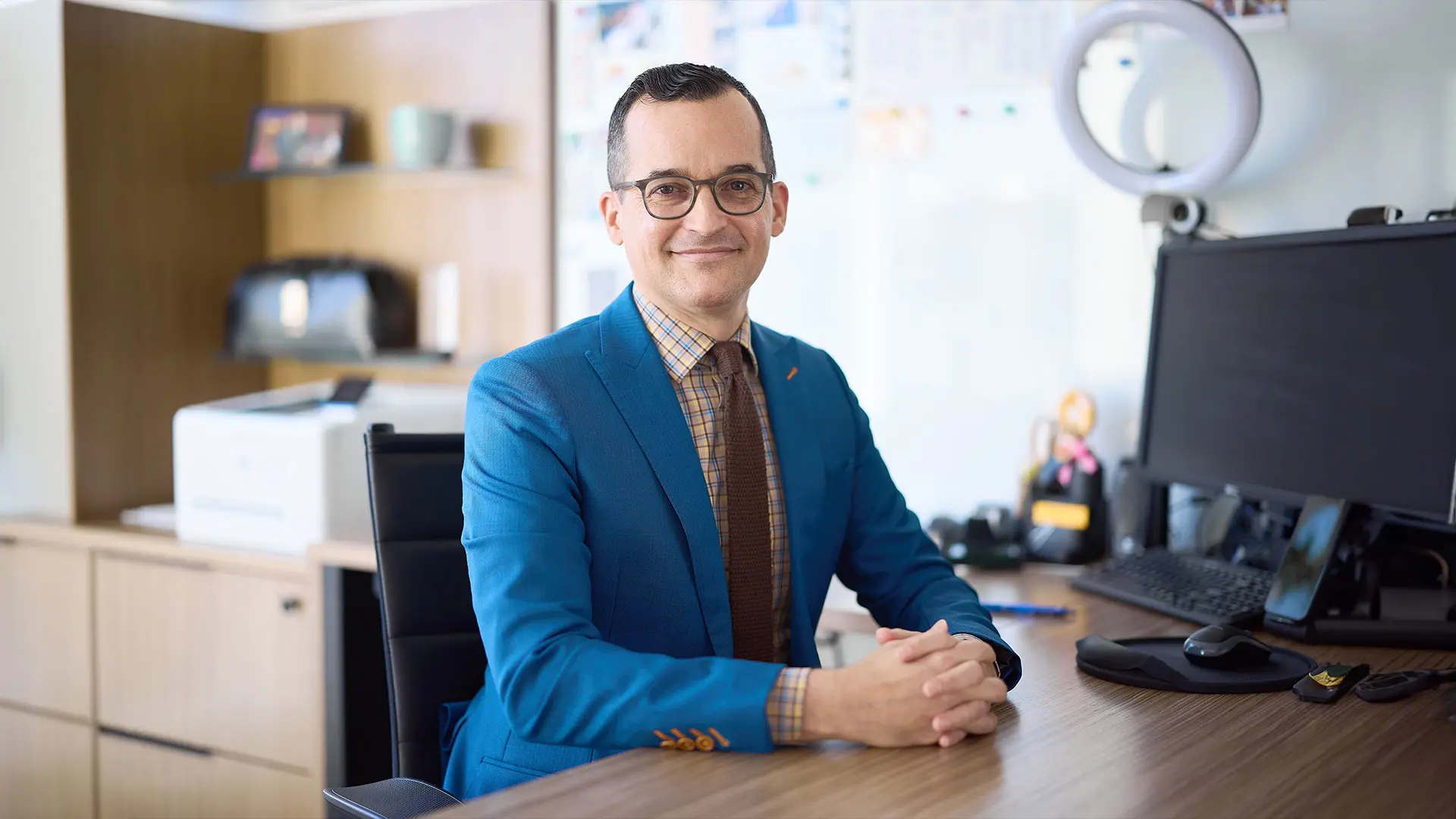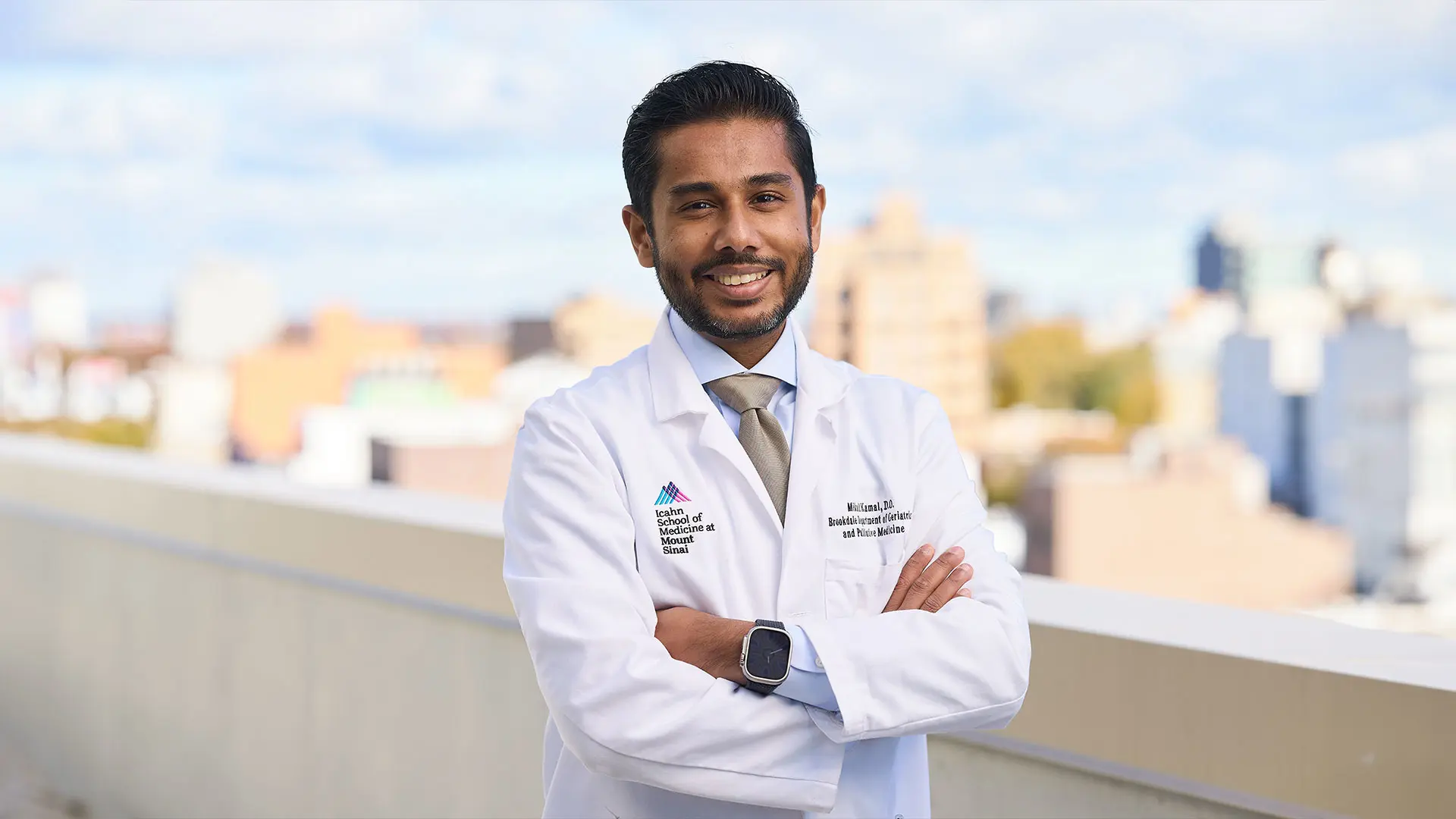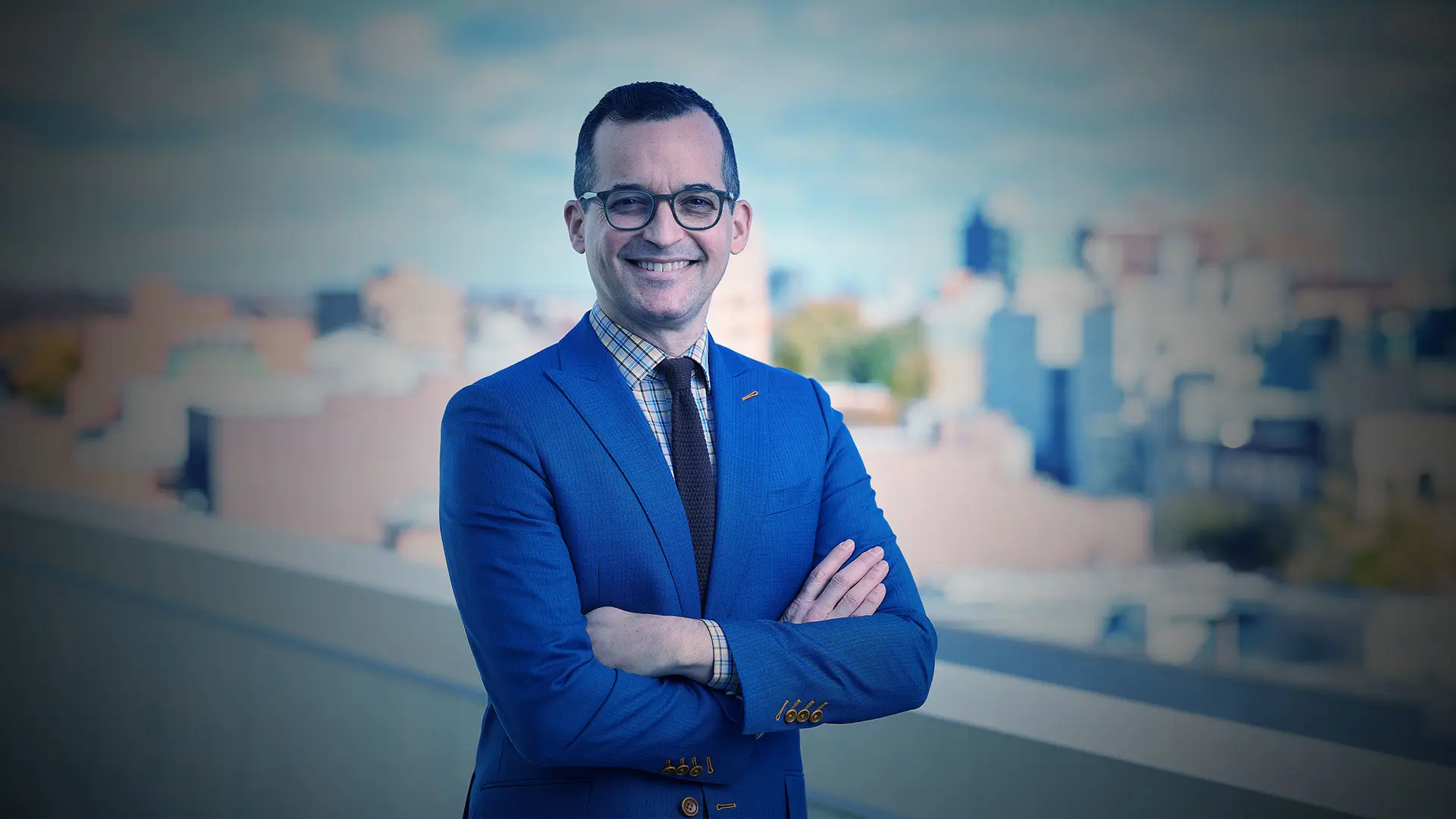After finishing his geriatrics fellowship at The Mount Sinai Hospital, Mikail Kamal, DO, a geriatrics and family medicine physician, recently began working at Mount Sinai Queens as part of an innovative new program to expand services for older adults.
To explain the hospital’s new approach, he likes to tell a story about Cameron R. Hernandez, MD, the hospital’s Executive Director and Chief Operating Officer since 2021, who hired him. As he walks the hospital corridors with Dr. Hernandez, he notices how carefully Dr. Hernandez pays attention to the smallest details.
One time, Dr. Hernandez saw an older patient at the opposite end of the hallway. The patient was walking hesitantly with his cane. Dr. Hernandez quickened the pace to catch up. He knew the problem: The cane wasn’t screwed together properly, causing him to walk crookedly. He borrowed the cane and fixed it in a few moments. The patient thanked him.
It’s attention to small details such as this—those that can make a big difference in the quality of life for older adults—that is part of the overall approach Dr. Hernandez brings to Mount Sinai Queens, where 70 to 80 percent of patients are 65 or older. The hospital serves an extremely diverse population of numerous immigrant communities, where it is common for multiple generations to live together, one reason for the concentration of older adults.

“We believe are providing a great service to the community here in Queens," says Cameron R. Hernandez, MD, Executive Director and Chief Operating Officer, Mount Sinai Queens. "I believe this is the wave of the future.”
The approach combines specific changes to processes and facilities, such as using private rooms when possible, combining imaging equipment in one place, starting a geriatrics consult service, and educating clinicians throughout the hospital, with smaller touches such as noticing eating habits and signs of disorientation, or talking regularly with family and caregivers. These combine to help bring a more humanistic touch, they say.
Dr. Hernandez, who is also a Professor in the Brookdale Department and Department of Medicine at the Icahn School of Medicine at Mount Sinai, began thinking about the initiative ever since arriving at Mount Sinai Queens five years earlier as Chief Medical Officer.
“I wanted to bring in geriatrics from the beginning because I know how critical it is,” says Dr. Hernandez, who also was a geriatrics fellow at Mount Sinai 20 years before Dr. Kamal. “We are just starting on this journey. We believe are providing a great service to the community here in Queens. I believe this is the wave of the future.”

“Part of geriatrics is developing relationships with the family and mitigating the fear people have of doctors,” says Mikail Kamal, DO, a geriatrics and family medicine physician and the first geriatrician working in patient care at Mount Sinai Queens.
A key element is training other clinicians, including hospitalists, physician assistants, and nurses who provide the bulk of the care. Among the areas where they hope to improve training is in issues of particular concern to older adults, such as falls, incontinence, cognitive impairment, confusion (or delirium), and the appropriate medications.
Though still in the early stages, the launch of the new initiative is going well, he says, and he has plans to expand, which could include hiring a dedicated geriatric social worker.
One of his first moves was to hire Dr. Kamal, who would become the first geriatrician working in patient care at the hospital. Dr. Kamal had just completed the Department’s LEAP Into Geriatrics Fellowship (Learn, Educate, Advocate, and Promote) and spent much of his two years at Mount Sinai Morningside watching the hospital’s first geriatrics program develop from the ground up. He was one of the first Fellows to rotate there and spent time with Omar Amir, MD, MS, Director of the Geriatrics program, learning about the experience.
For now, his primary focus is establishing a geriatrics consult service to advise other clinicians at the hospital. It’s an informal arrangement, but in his first two months his schedule has been filled with these consults, seeing almost 90 patients.
These consults offer the opportunity to tease out details of the patient’s lives, and to pass along to colleagues some primary geriatrics skills he learned during this fellowship training.
“Part of geriatrics is developing relationships with the family and mitigating the fear people have of doctors,” says Dr. Kamal, who is also an Assistant Professor, Geriatrics, at Icahn Mount Sinai.
Most of these consults focus on three key issues:
Goals of Care: Many of the older patients and their families at Mount Sinai Queens have never had a discussion with a health care provider to identify the patient’s health care wishes and ensure the care meets these goals, he says. Common topics include whether older adults who are being treated for ongoing conditions, such as chronic congestive heart failure or chronic obstructive pulmonary disease, would want to be resuscitated or be intubated, and whether they want to return to live at home or to a special facility.
Delirium: Clinicians busy running a hospital floor may be quick to identify delirium as a problem when it may be something else, according to Dr. Kamal. Many clinicians may assume delirium means patients are hyperactive, or acting out, even pulling out intravenous tubes. In fact, the more troublesome cases of delirium can be older patients who may be withdrawn, and who get overlooked as a result. On his consults, he may discuss minimizing the use of certain medications.
In one case, an older man was recovering from his illness but had stopped eating for no apparent reason and was strangely pushing his food away. The staff was concerned and considered a feeding tube. They wondered if he could have experienced a stroke or delirium. Dr. Kamal spoke at length with the patient’s family. Knowing how bland hospital food can be, he suggested the family bring the patient his favorite spicy foods from home, the foods he was comfortable with. The patient immediately resumed eating. As a result, clinicians could begin planning for his discharge, rather than considering more medical procedures.
“Patients sometimes need mental anchors to help them snap out of it,” says Dr. Kamal, whose parents emigrated from Bangladesh to the United States when he was 10 year old and who grew up in New York City. “I have families bring in their favorite sweaters or perfume or aftershave, which bring back memories embedded deep in our brain, which can help bring people back to reality. I can help families and the care team identify those cues.”
Polypharmacy: A consult can also help ensure health care providers understand all of the medications a patient may be taking, which in the case of older adults may mean talking to family members. In one case, clinicians were trying to understand the situation of a patient who was extremely confused when brought to the hospital. The patient had moderate dementia and seemed to be delirious, striking other patients. Dr. Kamal learned in a long phone call with a family member that for the last two months, the family had been giving the patient an antihistamine every night to help them sleep. He concluded that medication was probably causing the behavior.
Dr. Kamal hopes to use his training and experience, including a previous stint as a tech entrepreneur, to expand the program at Mount Sinai Queens. For now, he is collecting data he hopes will eventually be used to assess what aspects of the program have been the most effective.
“We will look at the data in about a year and see where we have been most effective and then adjust based on that,” he says. “It’s a work in progress.”
